八年级英语下册期末复习
人教八年级下册英语期末专项复习——词汇与句子(含答案)
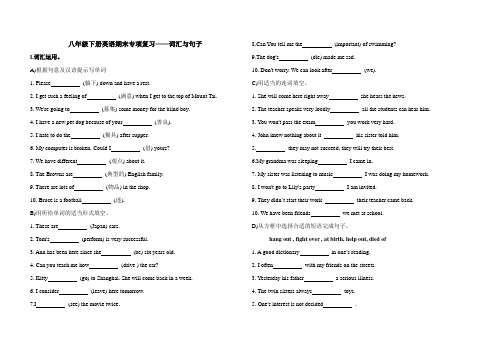
八年级下册英语期末专项复习——词汇与句子I.词汇运用。
A)根据句意及汉语提示写单词1. Please (躺下) down and have a rest.2. I get such a feeling of (满意) when I get to the top of Mount Tai.3. We're going to (募集) some money for the blind boy.4. I have a new pet dog because of your (善良).5. I hate to do the (餐具) after supper.6. My computer is broken. Could I (借) yours?7. We have different (观点) about it.8. The Browns are (典型的) English family.9. There are lots of (物品) in the shop.10. Bruce is a football (迷).B)用所给单词的适当形式填空。
1. These are (Japan) cars.2. Tom's (perform) is very successful.3. Ann has been here since she (be) six years old.4. Can you teach me how (drive ) the car?5. Kitty (go) to Shanghai. She will come back in a week.6. I consider (leave) here tomorrow.7.I (see) the movie twice. 8.Can You tell me the (important) of swimming?9.The dog's (die) made me sad.10. Don't worry. We can look after (we).C)用适当的连词填空。
仁爱版英语八年级下册_期末专项复习(完形填空)

期末专项复习(一)考查内容: 八年级(下册)Unit 5~Unit 8完形填空(一)I am a lovely and happy boy. I love life. I 1 my parents, teachers, friends and classmates, and I also love my city and the world. But sometimes I am in trouble. I want to do everything 2 . I want to be a good boy. I want everyone to love me. IfI do something 3 , I'll feel unhappy. I'll think I am good for nothing and I'll be4 for some time. Then they5 tell me the following.“You can't do all things 6 than anyone else. You can't do all things at a time. You have to decide 7 comes first, and then do that. ”“You'll have to learn to accept yourself. You'll have to live with your limitations. You are just 8 . You're wonderful. It's your duty to be who you are. ”It's true that I can't make 9 good, but I'll try my best. Then I'll become myself-a 10 child. So my world will become beautiful and be full of happiness. ( ) 1. A. dislike B. love C. follow D. remember ( ) 2. A. well B. good C. bad D. nice( ) 3. A. exciting B. interesting C. wrong D. right( ) 4. A. happy B. upset C. pleased D. proud ( ) 5. A. often B. never C. seldom D. nearly ( ) 6. A. well B. good C. better D. best( ) 7. A. something B. anything C. which D. what( ) 8. A. myself B. yourself C. himself D. yourselves ( ) 9. A. other things B. nothing C. everything D. anything ( ) 10. A. funny B. lucky C. lonely D. lovely(二)At lunch time, Bonnie and Ruth sat together eating lunch as usual. Ruth and Bonnie were best friends. They 1 sandwiches, cupcakes and almost everything.But today things were different. Bonnie looked upset, and Ruth did not know why. "Why are you sad today, Bonnie? ”Ruth asked. “Because my daddy 2 his jobyesterday, ” she said. “And we may have to move. My mom and dad are very unhappy and they always argue(争吵). I am 3 .What is going to happen to us? ”Bonnie's news made Ruth very sad, too. What would life be like 4 Bonnie? What could she do to help her friend? When Ruth went home she told her mom the bad 5 .“What can I do to help? ”she asked.“I'm not sure, Ruth, ” said her mother sadly.Ruth thought and thought.“What can I do? ”she 6 .The next day was Saturday and Ruth woke up very early. She ate a quick breakfast, and then went to find her friends. They all decided to help Bonnie. The children 7 their money. They got three hundred dollars! Ruth's mom took them to the store and they bought food, soap and all kinds of things that a person might need.When they left the store they went to Bonnie's house and each of the children8 carried a bag to the door, rang the doorbell and ran. They had so much fun with9 secret surprise! They knew it would make Bonnie very happy.Ruth felt happy too, because she helped her friend. She knew it wasn't much, but all she needed to do was to show her friend that she 10 . I think Bonnie got the message, don't you?( ) 1. A. found B. made C. shared D. bought ( ) 12. A. changed B. lost C. enjoyed D. got( ) 3. A. worried B. lonely C. disappointed D. surprised ( ) 4. A. to B. with C. for D. without ( ) 5. A. story B. result C. news D. report ( ) 6. A. shouted B. laughed C. talked D. wondered ( ) 7. A. collected B. saved C. raised D. spent ( ) 18. A. usually B. quietly C. easily D. quickly ( ) 9. A. their B. his C. her D. its( ) 10. A. helped B. cared C. understood D. knew(三)We live in a busy world, so we really need to relax ourselves. But how to take a break when you can't get a vacation? Please take these 1 .Action One: Turn offWhen you are falling asleep, maybe there are some devices(设备)around you. It is one of the 2 why you can't have a good night's sleep. It's also why you can 3 awake(醒着的)in bed for hours, and wake up in a bad mood. So don't use any device 4 an hour before bed-turn them off.Action Two: Have your own timeA great way to avoid stress is to make sure you have some time just for 5 daily. You may read something interesting, listen to music, or just drink your coffee slowly and do 6 . It's your 7 time and no one can take it from you.Action Three: Meditate(冥想)It doesn't need to 8 a long time. You may just sit for 2 minutes and try to empty(清空)your mind. It can help your heart jump more slowly. It 9 makes your body in a good condition. So give it a try.That's 10 you can be relaxed and comfortable without having to take a vacation.( ) 1. A. ideas B. actions C. rules D. questions( ) 2. A. reasons B. facts C. result D. ways( ) 13. A. make B. come C. look D. stay( ) 4. A. less than B. more than C. at least D. at last( ) 5. A. myself B. yourself C. ourselves D. themselves ( ) 16. A. nothing B. anything C. everything D. something( ) 7. A. busy B. work C, free D. business( ) 8. A. take B. spend C. cost D. use( ) 9. A. too B. either C. never D. also( ) 10. A. why B. what C. when D. how(四)Clothes are important in our life. Different people wear 1 clothes. Now let's2 some people talking about clothes.Hello, my name's Betty. I started working this year, so I'm able to get new clothes more often 3 before. There are different people in my working place every day. If someone sees me in 4 once, I don't like to go out in it again. I like to wear bright colors and always dress up when I go to parties. I buy all kinds of clothes and I try to follow the latest way of 5 .Hi, I'm Jack. I don't have much to say about clothes. Shopping 6 clothes isn't really the way of life I'm interested in. Since I'm still at a college, I don't really mind7 . I have two jackets and I often wear 8 . I know least about the way of dressing.I don't like the serious look.My name is Alice. I'd like to say that my clothes have to be comfortable and make me 9 easy as soon as I put them on. Sometimes I buy clothes in some small markets-they're less expensive there. I go shopping for clothes about once a month, though. If I see 10 and fit for me, I would maybe go for it there and then.( ) 1. A. the same B. different C. beautiful D. comfortable ( ) 2. A. listen to B. hear C. to listen to D. to hear( ) 3. A. as B. like C. than D. long( ) 4. A. something B. anything C. nothing D. everything( ) 5. A. dress B. dressing C. dresses D. to dress( ) 6. A. of B. in C. for D. on( ) 7. A. what I wear B. what do I wear C. what I wore D. what did I wear ( ) 8. A. it B. them C. their D. they( ) 9. A. feel B. feels C. feeling D. to feel( ) 10. A. something comfortable B. anything comfortableC. comfortable somethingD. comfortable anything(五)Traffic rules help to keep order on the road. They also help to keeppeople__1__.The pedestrian(行人)has as many rules to__2__as the driver of a car. You shouldwalk on the sidewalk(人行道)or at the side of the road. Always look__3__before you walk across the street.If you like riding a bike, don't ride in the middle of the road or run__4__red traffic lights. When you ride a bike with a friend, don't look around or talk. If you drive a car, you should__5__at the traffic lights. You must always__6__a seat belt(安全带). Without belts__7__the driver and the passengers may be badly hurt in a sudden accident.You may not need to take a bus, but__8__if you have to travel in one. Get on or get off a bus only when it comes to a__9__. When it is full, don't try to get inside__10__you may fall off.Traffic rules are also called Road Safety rules. The maxim(格言)for all road users is “ Thinking ab out others”.( ) 1. A. healthy B. safe C. happy D. careful( ) 2. A. follow B. make C. break D. pass( ) 13. A. happy B. happily C. careful D. carefully( ) 4. A. through B. across C. along D. around( ) 5. A. speed up B. go ahead C. get off D. slow down( ) 6. A. take B. wear C. carry D. bring( ) 7. A. half B. none C. both D. all( ) 8. A. look around B. lake care C. take a seat D. look back( ) 9. A. sign B. stop C. corner D. crossing( ) 10. A. and B. so C. or D. but(六)I'm taking my family to other countries to have a trip. We are going by train 1 New York, and then take a ship to Europe. When we __2__ in Europe, we're going to some countries for sightseeing. We'll go to places__3__by train or by bus. We are planning to fly home.It __4__ us a long time to decide where to go, but I think we have planned a very __5__ tip. We will go to England, France and Italy. My wife is very interested in __6__ to France because she is a teacher of French. And my brother is looking __7__to a trip to Italy because he speaks Italian very well.We also __8__ about how we would go to Europe. At first we wanted to fly because it would be __9__ and would save more time. But my brother likes to take a boat trip and the children __10__ that, too. What do you think of my trip?( ) 1. A. to B. for C. in D. at( ) 2. A. got B. reach C. arrive D. get( ) 3. A. also B. too C. either D. neither( ) 4. A. paid B. took C. spent D. cost( ) 5. A. pleasure B. interested C. interest D. interesting( ) 16. A. looking B. going C. coming D. seeing( ) 7. A. forward B. after C. over D. for( ) 8. A. spoke B. told C. said D. talked( ) 9. A. faster B. fast C. quickly D. more quickly ( ) 10. A. have B. liked C. enjoy D. enjoyed(七)Many Americans like to have their holidays in__1__countries. One day an American__2__comes to China. This is her first time to China and she wants to__3__some friends there. She meets a Chinese. This Chinese wants to talk__4__with the American. When he sees her, he comes up and says“__5__”to her, then he begins his first talk with someone__6__an English-speaking country. “How old are you? ” the Chinese__7__. “ I'm__8__. Please don't ask a lady(女士)about her__9__, ” answers the woman. The Chinese is surprised. He doesn't know__10__. Can you help him?( ) 1. A. another B. the other C. other D. others( ) 2. A. man B. boy C. woman D. child( ) 3. A. make B. making C. having D. do( ) 4. A. with English B. with Chinese C. in English D. in Chinese ( ) 5. A. OK B. Hello C. Sorry D. Goodbye ( ) 6. A. in B. at C. of D. from( ) 7. A. says B. tells C. talks D. speaks( ) 8. A. sure B. worried C. glad D. sorry( ) 9. A. supper B. age C. job D. family( ) 10. A. how B. why C. what D. which(八)There was once a man who was very rich but very tightfisted(吝啬的)at the same time. Nobody__1__him in the village. One day he said to them, “I know you don't like me. When I__2__, I will give everything to you. Then everyone will be__3__. ”Even then nobody believed him. The rich man couldn't__4__why they didn't believe him. One day he went for a walk. Under a tree he happened to hear a pig and a cow__5__.The pig said to the cow, "Everybody likes you__6__nobody likes me. Why? When I provide people with meat, ham(火腿)and so on, I give three or four things to them. But you give only one thing-milk. Why do people like you__7__but not me? ”The cow answered, "Look, I give them milk while I'm__8__. They see that I am generous(慷慨的)with what I__9__. But you don't give them anything while you're alive. Only after you're dead do you give them meat, ham and so on. People don't believe in the__10__, they believe in the present(现在). If you give while you are alive, people will like you. "From that moment on, the rich man wasn't tightfisted any more. Everyone began to like him. And he felt quite happy.( ) 1. A. believed B. liked C. hated D. knew ( ) 2. A. die B. leave C. return D. arrive ( ) 3. A. frightened B. happy C. angry D. safe ( ) 4. A. agree B. understand C. remember D. forget ( ) 5. A. crying B. laughing C. singing D. talking ( ) 6. A. because B. so C. but D. or( ) 7. A. sometimes B. all the time C. at the beginning D. in the end ( ) 8. A. alive B. dead C. busy D. free ( ) 9. A. like B. have C. eat D. say( ) 10. A. lifetime B. competition C. friendship D. future期末专项复习(一)答案(一)1. B【解析】下文中有一个also说明这里指的也是同一种情况, 下文的动词是love, 所以这里也选love。
江西初中英语八年级下册期末经典复习题(含答案)

一、选择题1.—I don’t like smoking.─_____________.A.Neither he is B.Neither is heC.Neither he does D.Neither does he D解析:D【解析】句意:——我不喜欢抽烟。
——他也不喜欢。
根据句意可知本题考查固定的句式结构“Neither+助动词/情态动词/系动词+主语”,表示前面说的情况也适合于后面的情况,即他也不喜欢抽烟;主语是he,所以助动词用does,故答案选D。
点睛:本句考查倒装句,肯定句的倒装句是“So+助动词/情态动词/系动词+主语”,汉语意思是表示“…...也是”;否定句的倒装句是“Nor/Neither+助动词/情态动词/系动词+主语”,汉语意思是表示“…...也不”;对于助动词、情态动词和系动词的用法,应根据前句使用的词加以选择,与前句的词保持一致。
本题根据题干"我不喜欢抽烟",可知答语应是"他也不喜欢",所以应用neither;根据前句的don't可知时态是一般现在时,答语的主语是he,所以助动词用does;故答案选D。
2.The 2018Russia FIFA World Cup is interesting. It is worth .A.watch B.to watch C.watching C解析:C【解析】【详解】句意:2018年俄罗斯世界杯非常的有趣,值得看。
watch 观看,动词原形;to watch动词不定式;watching动名词。
考查固定词组be worth doing 值得做……,后接动名词,故选:C。
3.﹣I'm afraid of giving a speech in public.﹣______ I believe you can do it well.A.Take it easy.B.That's right.C.No problem.A解析:A【解析】【详解】句意:-我害怕在公共场合做演讲。
人教版八年级英语下册英语期末总复习试题
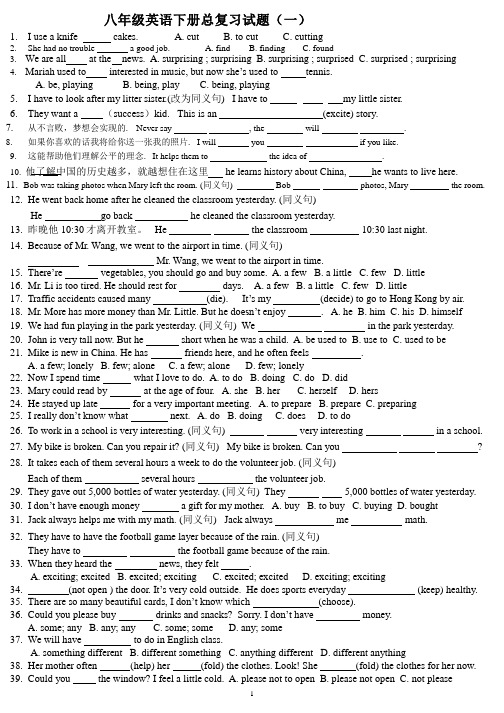
八年级英语下册总复习试题(一)1. I use a knife cakes. A. cut B. to cut C. cutting2. She had no trouble a good job. A. find B. finding C. found3. We are all_ at the news. A. surprising ; surprising B. surprising ; surprised C. surprised ; surprising4. Mariah used to interested in music, but now she’s used to tennis.A. be, playingB. being, playC. being, playing5. I have to look after my litter sister.(改为同义句) I have to my little sister.6. Th e y want a (success)k i d. Th i s i s an (excite) story.7. 从不言败,梦想会实现的. Never say , the will .8. 如果你喜欢的话我将给你送一张我的照片. I w ill you if you like.9. 这能帮助他们理解公平的理念. It helps them to the idea of .10. 他了解中国的历史越多,就越想住在这里h e lear ns h i s tor y about Ch i na, he wants to live here.11. Bob was taking photos when Mary left the room. (同义句) Bob photos, Mary the room.12. He went back home after he cleaned the classroom yesterday. (同义句)He go back he cleaned the classroom yesterday.13. 昨晚他10:30才离开教室。
期末知识点复习课件2022-2023学年人教版英语八年级下册
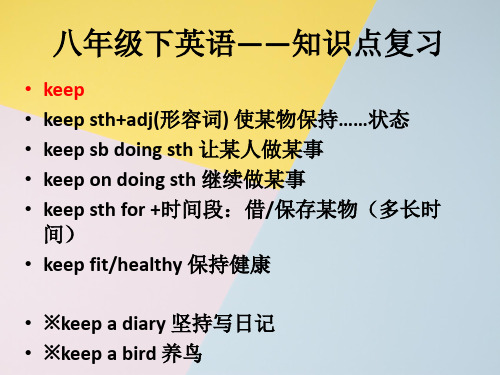
• 不定式 • learn to do sth 学会做某事 • encourage sb to do sth 鼓励某人做某事 • tell sb to do sth 告诉某人要做某事 • tell sb not to do sth 告诉某人不要做某事 • invite sb to do sth 邀请某人做某事 • invite sb not to do sth 邀请某人不做某事 • decide to do sth 决定做某事 • decide not to do sth 决定不做某事 • have to 必须don’t have to 不必 • try to do sth 尽力做某事 • try not to do sth 尽力不做某事
• so/such:如此…… • 用法如下: • such+名词短语 • so +形容词 • so many/much/few/little
• 一点儿 • a little 一点儿(修饰不可数名词和形容词) • a bit 一点儿(后接形容词) •
•
• put • put out 熄灭 • put on 穿上 • put off 下车 • put up 挂起、张贴 • put down 放下
八年级下英语——知识点复习
• keep • keep sth+adj(形容词) 使某物保持……状态 • keep sb doing sth 让某人做某事 • keep on doing sth 继续做某事 • keep sth for +时间段:借/保存某物(多长时
间) • keep fit/healthy 保持健康
• either…or…或者……或者……,连接两个主语时,谓 语动词在数的方面与or后面的主语保持一致。
(必考题)初中英语八年级下册期末复习题(含答案解析)
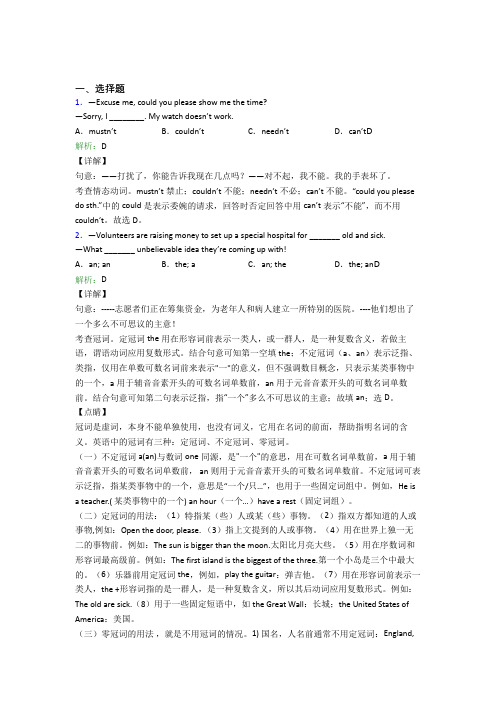
一、选择题1.—Excuse me, could you please show me the time?—Sorry, I ________. My watch doesn’t work.A.mustn’t B.couldn’t C.needn’t D.can’t D解析:D【详解】句意:——打扰了,你能告诉我现在几点吗?——对不起,我不能。
我的手表坏了。
考查情态动词。
mustn’t禁止;couldn’t不能;needn’t不必;can’t不能。
“could you please do sth.”中的could是表示委婉的请求,回答时否定回答中用can’t表示“不能”,而不用couldn’t。
故选D。
2.—Volunteers are raising money to set up a special hospital for _______ old and sick. —What _______ unbelievable idea they’re coming up with!A.an; an B.the; a C.an; the D.the; an D解析:D【详解】句意:-----志愿者们正在筹集资金,为老年人和病人建立一所特别的医院。
----他们想出了一个多么不可思议的主意!考查冠词。
定冠词the用在形容词前表示一类人,或一群人,是一种复数含义,若做主语,谓语动词应用复数形式。
结合句意可知第一空填the;不定冠词(a、an)表示泛指、类指,仅用在单数可数名词前来表示"一"的意义,但不强调数目概念,只表示某类事物中的一个,a用于辅音音素开头的可数名词单数前,an用于元音音素开头的可数名词单数前。
结合句意可知第二句表示泛指,指“一个”多么不可思议的主意;故填an;选D。
【点睛】冠词是虚词,本身不能单独使用,也没有词义,它用在名词的前面,帮助指明名词的含义。
英语中的冠词有三种:定冠词、不定冠词、零冠词。
初中英语 人教版八年级下册期末总复习(讲练+习题含答案,共104张PPT)
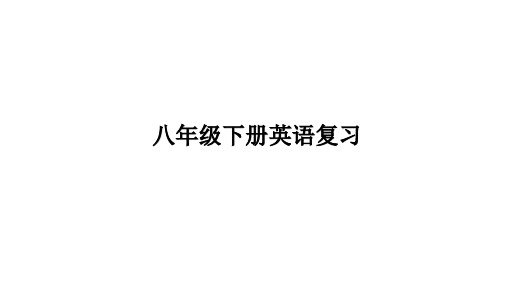
3. I think there will be more / less pollution. 我认为将会有更多/更少的污染。
fewer与less及more表数量的用法。
(3)many“许多”,修饰可数名词。 much“许多”,修饰不可数名词。
many / much比较级、最高级为不规则变化:many / much-more-most
“a few”表示“一些”+可数名词
例:a few days ago, for a few weeks, He has few friends here. There will be fewer trees.
3. I think there will be more / less pollution. 我认为将会有更多/更少的污染。
He went home after two days. 他两天后回家了。 Three years later,she had a baby. 三年后,她生了一个婴儿。
fall in love with 爱上… fall in love with a girl 爱上一个女孩 fall in love with a country 爱上一个国家
例:I have many magazines. She has more magazines. But he has the most. There will be more people on the earth in future. More and more students start to exercise more every day to keep fit.
典例展示 2.About Pollution
Tina: There is much pollution around us.
期末复习人教版英语八年级下册

八下英语作文专项清单Unit 1 what’s the matter?【话题概述】本单元以“健康与急救”为话题,围绕这一话题谈论生活中存在的健康问题或意外事件,并给出合理建议。
写作时,学生应该学会用“have a/an/the+表示疾病的名词(短语)”来描述健康问题,用should或shouldn’t来提建议。
范文①:健康的身体是中学生有效学习的保证。
但是网络抢走了我们的锻炼时间,垃圾食品威胁着我们的健康。
请根据下面的提示内容,以“How to Keep Healthy”为题写一篇英语短文。
内容包括:1.坚持锻炼;2.健康饮食;3.合理上网;4.保证充足的睡眠;5.保持愉快的心情。
要求:1.词数不少于80 词;2.文中不得出现真实的人名、校名。
How to Keep HealthyIt’s important for us to keep healthy. As middle school students,we should have a healthy lifestyle. Here is some advice.First,we should do exercise at least one hour a day,such as running and walking. Second,have a healthy diet. Eat more fruit and vegetables. Try not to eat junk food. Third,we shouldn’t spend too much time going online. It is bad for our eyes and study. Fourth,go to bed early and don’t stay up too late,because enough sleep is good for our health. Finally,be happy as possible as we can. Learn to smile at ourselves at any time.If we do so,I believe we can keep healthy.范文②:你的朋友Jack由于长时间玩电脑游戏,现在头痛、眼睛不舒服、背部酸痛,并且睡不好觉。
- 1、下载文档前请自行甄别文档内容的完整性,平台不提供额外的编辑、内容补充、找答案等附加服务。
- 2、"仅部分预览"的文档,不可在线预览部分如存在完整性等问题,可反馈申请退款(可完整预览的文档不适用该条件!)。
- 3、如文档侵犯您的权益,请联系客服反馈,我们会尽快为您处理(人工客服工作时间:9:00-18:30)。
八年级英语下册期末复习 The document was prepared on January 2, 2021八年级英语下册期末复习资料世纪中期2.保持一样3.学校对面4.学习阅读和数数5.存在6.把…视为7.找工作8.拥有所有他童年的记忆9.通过..猜..10.根据11.从我记事起12. 太遗憾了13.那么一个幸福的童年14.考虑…15.成为这个地方的一种象征16.数百万中国人17.将近三年18.带着浓厚兴趣19.把许多温暖甜美的记忆留在我们的心里20.它在镇上做的菜最好。
(1) 一般现在时表示现阶段经常或习惯发生的动作或存在的状态,或说明主语的特征。
①一般现在时句子中常有的时间状语:often,usually,sometimes,always,every (day等), once/twice,a (week等), on (Sunday等),never,in the (morning等)。
如:They go to the Palace Museum once a year.(他们每年去一次故宫)/ They often discuss business in the evening.(他们经常在晚上商谈生意)②表示客观真理、事实、人的技能或现在的状态时句子里一般不用时间状语。
如:The earth turns round the sun.(地球绕着太阳转)/ Light travels faster than sound.(光传播比声音快)③表示十分确定会发生(如安排好的事情)或按照时间表进行的事情,用一般现在可以表达将来,句子中可以有将来时间。
如:The train for Haikou leaves at 8:00 in the morning.(开往汉口的列车上午8点开车)④在时间状语从句中(以when, after, before, while, until, as soon as等引导)和条件状语从句中(以if,unless引导),用一般现在时代替一般将来时,句子可以有将来时间。
如:Please ring me up as soon as you arrive in Germany.(你一到德国就给我打电话) / If it rains tomorrow,we will have to stay at home.(如果明天下雨我们就只好呆在家)⑤一般现在时用于倒装句中可以表示正在发生的动作,动词以come, go为主。
如:Here comes the bus. (车来了) / There goes the bell.(铃响了)。
⑥人的心理活动和感官动作一般用一般现在时而不用现在进行时表达,常见动词有:like, love, hate, dislike, want, wish, hope, think(认为),understand, remember, forget, mean, need, hear, feel, see. 如:I think it is going to snow.(我想天要下雪了)/ I really hope you can enjoy your stay here.(我真的希望你愉快地呆在这儿)(1) 一般过去时表示过去某时发生的动作或状态,这种动作或状态可能是一次性,也可能经常发生。
①表示过去具体时刻发生的一次性动作时,时间状语有:at (eight) (yesterday morning),(ten minutes) ago, when引导的时间状语从句。
如:I got up at 6:00 this morning.(我是早上六点钟起床的)/ Little Tom broke the window at half past nine this morning.(小汤姆今天早上九点半把窗子打破了)/ When he went into the room,he saw a stranger talking with his father.(他走进房间时发现一个陌生人正和他父亲谈话)②表示过去一段时间内不知何时发生的一次性动作时,时间状语有:yesterday, last (year等), in (1998 等)。
如:He came to our city in the year 2000.(他2000年来到我们市) ②表示过去一段时间内不知何时发生的一次性动作时,时间状语有:yesterday, last (year等), in (1998 等)。
如:He came to our city in the year 2000.(他2000年来到我们市) ③表示过去一个阶段中经常发生的事情时,时间状语有:last…, in…, from…to…,for(10 years),often,usually, sometimes, always, never等。
如:Mr Jackson usually went to evening schools when he was young. / Every day he went to the rich man and borrowed books from him.④讲故事、对过去经历的回忆、双方都明白的过去事件等一般用过去时,而且经常省略时间状语。
如:I happened to meet Rose in the street.(我正好在街上遇到露西)(1) 一般将来时表示将来某一时刻或经常发生的动作或状态。
①一般将来时的时间状语有:tomorrow,this (afternoon),next (year),one day,now,soon,someday,sometime, in the future, when引导的从句等。
②用will构成的将来时,表示动作与人的主观愿望无关。
“shall”用于第一人称,“will”用于所有人称。
如:I will graduate from this school soon.(我很快就要从这所中学毕业了)/ You will stay alone after I leave.(我走了之后你就要一个人过了)③“am/is/are going to+动词原形”表示打算或准备要做的事情,或者主观判断即将要发生的事情,而“am/is/are to +动词原形”表示安排或计划中的动作。
如:A man told them that the woman was to give birth to the special baby.(有一个人告诉他们那个妇女就会生下那个特别的男孩)/ It’s going to rain soon.(天快要下雨了)④表示一个人临时决定要做某事,可以用will表达。
如:I will go to the lab to get some chemicals(化学药剂). So please wait until I return.(我要到化学实验室去取些药品,请等我回头)⑤现在进行时、一般现在时也可以表示将来。
(见相应时态)⑥shall和will在口语的一些疑问句中相当于情态动词。
Shall一般与第一人称连用,will 与第二人称连用。
如:Shall we go to the zoo next Saturday(我们下周六去动物园好吗)/ Will you please open the door for me(替我把门打开好吗)⑦“be to +动词原形”表示按照计划将要发生的事情。
如:An angel came to tell her that she was to have this special boy.(4)现在进行时现在进行时表示现在正在进行的动作或是现阶段正发生而此刻不一定在进行的动作。
①现在进行时由“助动词be (am is are ) +现在分词”构成。
②现在进行时的时间状语有:now, this …, these…等,但经常不用。
如:What are you doing up in the tree(你在树上干什么)/ I am writing a long novel these days.(我最近在写一本长篇小说)③表示即将发生的动作,一般指近期安排好的事情。
常见的动词有:come, go, stay, leave, spend, do等。
如:I’m coming now.(我就来)/ What are you doing tomorrow(你明天干什么)/ He is leaving soon.(他就要走了)④表示频繁发生或反复进行的动作,常与always等频度副词连用,以表示赞扬、不满或讨厌等感情色彩。
如:He is always borrowing money from me and forgetting all about it some time later.(他老是向我借钱,过一些时候就忘得一干二净)(5)过去进行时过去进行时表示过去某一时刻或某阶段正在进行的动作。
①过去进行时由“was(第一、三人称单数)或were(第二人称单数和各人称的复数)+现在分词”构成。
②过去进行时的时间状语有:then, at that time, this time yesterday, at (eight) yesterday (morning),(a year) ago, 以及由when引出的时间状语从句。
如:He was cooking supper this time yesterday.(昨天这个时候他正在做晚饭)/ The little girl was playing with her toy when I saw her.(我看到小女孩的时候她正在玩玩具)③用于宾语从句或时间状语从句中,表示与主句动作同时进行而且是延续时间较长。
句子中通常不用时间状语。
如:She was it happen when she was walking past.(她路过时看到事情的发生)/ They sang a lot of songs while they were walking in the dark forest.(他们在黑暗的森林里走时唱了很多歌)④也可以表示过去一个阶段频繁发生或反复进行的动作,常与always等频度副词连用,以表示赞扬、不满或讨厌等感情色彩。
如:He was always borrowing money from me when he lived here.(他住在这里时老向我借钱)(6)现在完成时现在完成时表示一个发生在过去的、对现在仍有影响的动作,或表示开始在过去,并且一直延续到现在,甚至还可能延续下去的动作。
